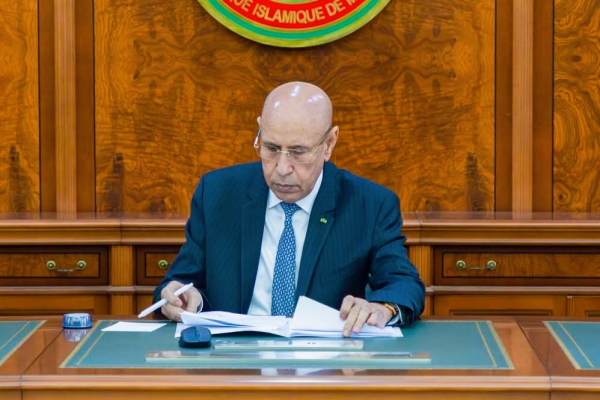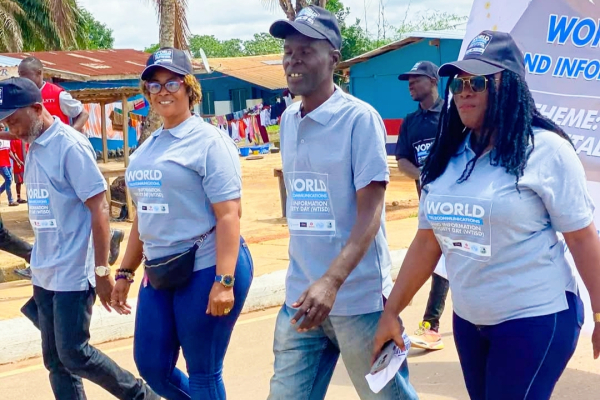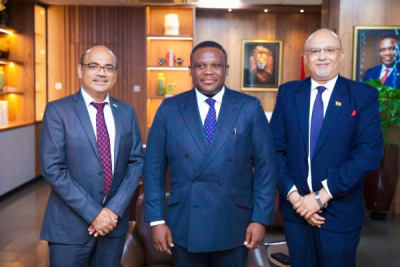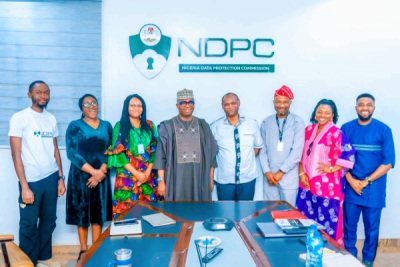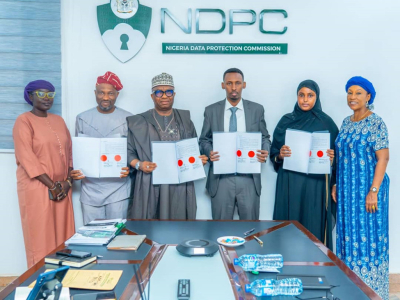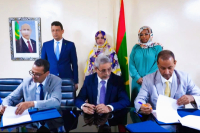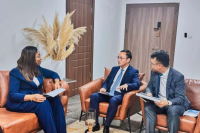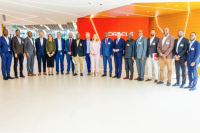
Public Management (599)
• Mauritania to digitize justice system under reform program led by President Ghazouani
• Key measures include IT infrastructure assessment, online nationality request system, and websites for courts and judicial services.
The Mauritanian government is set to integrate digital technologies into its justice reform program, one of the key directions adopted during a meeting of the High Committee for Justice Reform and Development, chaired on Tuesday, May 20, by President Mohamed Ould Ghazouani (photo).
According to the official statement released after the meeting, several measures are planned to modernize the justice system. These include conducting a diagnostic study to identify needs in IT equipment and digital infrastructure, creating an online system for processing nationality requests, and developing websites for courts and judicial services.
This initiative aligns with the Mauritanian government’s broader ambition for digital transformation. Authorities aim to integrate digital tools into public administration to modernize services, boost transparency, and stimulate social and economic development. Several services have already been digitized in recent months, including criminal record requests.
The digitization of the justice sector is supported by the United Nations Development Programme (UNDP). The agency notes that digital tools can enhance efficiency, transparency, and access to justice. “When implemented strategically, digital justice can advance the rule of law and protect human rights, while strengthening the effectiveness of judicial systems and institutions.”
However, the UNDP also warns of the risks linked to digitization. Digital systems may expose personal and legal data to abuse, including privacy violations, hacking, data sales, or biased predictive tools. Additional challenges include limited Internet coverage, lack of compatible equipment, high costs of digital services, and insufficient user skills.
By Isaac K. Kassouwi,
Editing by Sèna D. B. de Sodji
- Liberia launched community Wi-Fi hotspots in Bong and Nimba counties with CSquared Africa.
- Initiative aims to expand affordable Internet in public spaces like schools and health centers.
The Liberian government has begun rolling out community Wi-Fi hotspots across the country in an effort to enhance Internet access for its citizens. The initiative, launched last week in Bong and Nimba counties, is a partnership with telecom infrastructure provider CSquared Africa and other stakeholders. Its unveiling coincided with celebrations for World Telecommunication and Information Society Day.
"With new low-cost WiFi access at health centers, schools, and community spaces, we are actively working to enhance digital literacy and economic participation in underserved communities. This initiative reflects our commitment to ensuring that every Liberian can benefit from and contribute to the digital transformation," Liberia's Ministry of Posts and Telecommunications said in a statement published on Facebook.
Internet penetration in Liberia stood at 23.5% in 2023 for an estimated population of 5.6 million, according to data from the International Telecommunication Union (ITU). The high cost of Internet services is considered one of the main barriers to adoption by the Global System for Mobile Communications Association (GSMA). The ITU estimates that in 2024, mobile Internet expenses accounted for 8.2% of monthly gross national income (GNI) per capita, significantly higher than the 2% threshold considered affordable by the organization. Fixed Internet costs were even more prohibitive, at 153% of GNI per capita.
While community Wi-Fi hotspots could accelerate Internet adoption in Liberia, their deployment is currently limited to specific areas. The government has not yet specified a timeline for expanding the initiative nationally or provided details on access terms, particularly regarding potential costs for users.
Beyond affordability, service cost is not the sole obstacle to Internet adoption. The GSMA also highlights the limited availability of Internet-compatible devices such as smartphones, tablets, or computers. According to the ITU, only 59% of Liberians owned a phone in 2023, without specifying the proportion of smartphones. Other barriers include a lack of digital skills, limited user experience, and concerns about online security.
By Isaac K. Kassouwi,
Editing by Sèna D. B. de Sodji
-
Ghanaian Minister Samuel Nartey George and Indian Ambassador Shri Manish Gupta met to explore partnerships in digital payments, mobile banking, and financial inclusion.
-
Discussions also focused on developing Ghana as a coding hub in Africa and strengthening digital infrastructure to support innovation.
-
Talks are still in the early stages, with no formal agreements signed, but both parties expressed commitment to deepening collaboration.
The Ghanaian government intends to deepen its collaboration with India in the technology sector, a key topic during a meeting on Thursday between Ghana's Minister of Communication, Digital Technologies, and Innovation, Samuel Nartey George (photo, center), and India's Ambassador to Ghana, Shri Manish Gupta (photo, left).
During their discussions, both sides explored potential partnerships in areas such as digital payments, mobile banking, and financial inclusion. They also discussed the development of Ghana's tech ecosystem, with the aspiration of positioning the country as a coding hub in Africa. Finally, the talks centered on strengthening digital infrastructure to better support innovation and entrepreneurship.
This meeting is part of the Ghanaian government's broader international cooperation efforts aimed at digital transformation, which it views as a crucial driver for socioeconomic development. In recent weeks, Ghana has notably strengthened ties with Germany, Italy, Turkey, Israel, and Denmark. This is in addition to collaborations with entities and companies such as fiber optic firm CSquared, Deloitte, the African Regional Satellite Communication Organization (RASCOM), the United Nations Educational, Scientific and Cultural Organization (UNESCO), and Meta.
Currently, Ghana ranks 108th out of 193 countries on the United Nations e-Government Development Index, with a score of 0.6317. This is significantly higher than the African average of 0.4247 but slightly below the global average of 0.6382. India, in comparison, ranks 97th with a score of 0.6678.
Exchanges between Ghana and India are still in the initial stages. Both parties have committed to further exploring avenues for cooperation and identifying specific projects for implementation. However, no formal agreements have been signed or announced at this time, indicating that future developments will be necessary to provide more definitive insights into the prospects and potential impact of this collaboration.
By Isaac K. Kassouwi,
Editing by Sèna D. B. de Sodji
-
Delegations from Zambia and Zimbabwe visited the Nigerian Data Protection Commission (NDPC) to study its practices, aiming to replicate Nigeria's successful model.
-
Key focus areas included the public-private partnership model, human capital development, policy creation, and public awareness, as highlighted by NDPC Commissioner Vincent Olatunji.
-
The visit follows a growing need for robust data protection amid digital transformation, as noted by Yellow Card, while challenges persist in adapting the model to differing local contexts.
Zambia and Zimbabwe are looking to Nigeria for guidance in personal data protection, with separate delegations from the two Southern African nations making a working visit this week to the headquarters of the Nigerian Data Protection Commission (NDPC). The meetings took place on the sidelines of the General Assembly of the African Network of Personal Data Protection Authorities (RAPDP) held in Abuja, Nigeria.
"The purpose of the visit was for the delegations to understudy the day-to-day operations of the NDPC, with a view to replicating best practices in their respective countries," the NDPC said in a statement released on Wednesday, May 14.
Vincent Olatunji, the National Commissioner of the NDPC, provided the visiting delegations with an overview of the development of data protection in Nigeria. He emphasized that the Commission has developed a strategic roadmap that has served as its guide since the enactment of the Nigeria Data Protection Act of 2023. Olatunji highlighted the public-private partnership model as a key driver of the institution's success. Discussions also covered crucial areas such as human capital development, public awareness campaigns, policy formulation, and collaborative strategies.
This benchmarking visit occurs against a backdrop of rapid digital transformation and the widespread use of electronic communication services. "As more African countries go digital, protecting personal data and ensuring privacy has become a critical concern. People, businesses, and governments are increasingly aware of the need to safeguard personal information as the world becomes more interconnected," noted the cryptocurrency exchange platform Yellow Card in its 2025 report, "The State of Data Protection Laws in Africa."
This knowledge exchange could empower the data protection authorities of Zambia and Zimbabwe to enhance their capacity to fully execute their responsibilities, which, according to Yellow Card, include enforcing legislation, investigating breaches, and assisting businesses and citizens in adopting best practices. For instance, a joint 38-month investigation by Nigeria's Federal Competition and Consumer Protection Commission (FCCPC) and the NDPC found that WhatsApp had violated Nigerian data protection and competition laws, resulting in a $220 million fine imposed on its parent company, Meta, in July 2024.
However, replicating the Nigerian model in Zambia and Zimbabwe could present challenges due to differing national contexts. Furthermore, Yellow Card points out that the effectiveness of data protection authorities across the African continent varies due to disparities in resources, expertise, and political commitment.
By Isaac K. Kassouwi,
Editing by Sèna D. B. de Sodji
For developing nations, especially in Africa, embracing strong data protection is not only about catching up with global standards—it is about shaping a sovereign, secure, and inclusive digital future.
The Nigeria Data Protection Commission (NDPC) and the Data Protection Authority (DPA) of Somalia have signed a Memorandum of Understanding (MoU) aimed at enhancing cross-border collaboration on data protection and privacy enforcement. The signing followed the successful hosting of the 2025 edition of the Network of African Data Protection Authorities (NADPA-RAPDP) Conference and Annual General Meeting by the NDPC in Abuja, from 6-8 May, which drew participation from several African data protection authorities.
The agreement was signed by the National Commissioner/CEO of the NDPC, Dr. Vincent Olatunji, and the Director-General of DPA Somalia, Mr. Mohamed Nur Ali, at the NDPC headquarters in Abuja. The MoU outlines key areas of cooperation, including mutual legal assistance, information sharing, and joint efforts to promote compliance with data protection laws.
Delegations from The Gambia and Somalia had remained in Nigeria after the conference to study the NDPC’s operational model and strategic approach, which has earned the Commission growing recognition within the global data protection ecosystem.
Africa is undergoing rapid digitalization, but cross-border cooperation on data protection remains weak. Data protection is essential for preserving individual dignity and rights, building digital trust necessary for economic participation, enabling cross-border trade and innovation, strengthening national security and regulatory capacity, and guiding the ethical deployment of emerging technologies.
As of now, only 36 out of 55 African countries have enacted data protection laws, according to data from Data Protection Africa. Without cooperation agreements like this MoU, enforcement across borders becomes fragmented, making Africa vulnerable to data misuse, cybercrime, and privacy breaches. Formalizing cooperation between Nigeria and Somalia sets a precedent for other African nations to follow, helping to secure citizens’ data rights, strengthen national institutions, and create a more trustworthy digital environment for innovation and trade.
Hikmatu Bilali
From December 2 to 12, 2024, the Beninese Ministry of Digitalization launched a call for applications for Beninese MSMEs wishing to obtain the "startup label." The results were recently announced.
Beninese authorities on Friday announced the 15 micro, small, and medium-sized enterprises (MSMEs) awarded the "start-up label" for the next three years. These companies were selected from a pool of 95 applicants operating in sectors including health, tourism, and technology.
"After verifying the eligibility and completeness of the applications by the permanent secretariat of the technical labeling committee, twenty (20) applications were shortlisted and subjected to an evaluation process conducted by the committee [...]. At the end of the evaluation process, fifteen (15) micro, small, and medium-sized enterprises were granted the start-up label for the next three (03) years," stated the Beninese Ministry of Digitalization.
This selection follows a call for applications that ran from December 2 to 12, 2024, for Beninese MSMEs seeking the "startup label." The awarding of this label is part of the implementation of Decree No. 2023-095 dated March 22, 2023. Authorities intend to provide specific support to these labeled companies to encourage their growth in a favorable environment.
Under Benin's current general tax code, these labeled companies "benefit from a corporate tax exemption and exemption from employer salary contributions for the first two (2) years of activity, as well as a 50% reduction on the same taxes for the third year." The aim is to stimulate innovation, create jobs, and encourage investment in Beninese start-ups.
According to Briter Bridge's "Africa 2023 Investment Report Crisis or Adjustment," African start-ups attracted over $22 billion between 2013 and 2023. In 2024, they secured $3.2 billion, according to Partech Africa data. In the medium term, the "start-up label" initiative could foster the development of a competitive pool of start-ups at the regional and continental levels, while enhancing Benin's attractiveness as an innovation hub in West Africa. Senegal, Rwanda, and Tunisia have previously implemented similar measures to bolster their start-up ecosystems.
Adoni Conrad Quenum
- The platform will provide ongoing professional development for primary school teachers, accessible for free through all ISPs.
- The initiative includes setting up 63 computer labs, each with a server, to ensure platform access even without a direct internet connection.
- Trainers and technicians will be trained to manage and develop platform content, supporting the long-term sustainability of the initiative.
The Mauritanian government is set to launch a digital platform for the ongoing professional development of primary school teachers. A cooperation agreement to establish the platform was signed on Monday between the Ministry of Digital Transformation and Administrative Modernization and the Ministry of Education and Educational System Reform.
The digital platform will be offered free of charge to all teachers and accessible through all internet service providers in Mauritania. Plans also include the creation of 63 computer labs, one in each department. Each lab will be equipped with a server to provide platform access without requiring a direct internet connection.
"The agreement also encompasses a training program for trainers and technicians from the education ministry to enable them to manage the platform and develop its content, thereby ensuring its sustainability and effectiveness," the Ministry of Digital Transformation stated.
The implementation of this platform is part of the Mauritanian government's broader efforts to digitize the national education system. Earlier this year, education sector stakeholders began developing a roadmap for the digital transformation of the sector. Authorities are also working on a novel system to digitize diplomas, aiming to modernize their issuance and enhance their verification.
The Mauritanian government's focus on strengthening teachers' skills through the digital platform is intended to improve teaching quality and student outcomes. However, stakeholders have not yet announced a timeline for the platform's design or deployment. Furthermore, the issue of effective teacher adoption remains to be addressed. Beyond the planned computer labs, the system's success will also depend on individual teachers' access to digital devices like smartphones or computers.
By Isaac K. Kassouwi,
Editing by Sèna D. B. de Sodji
- Guinea seeks digital transformation through Huawei collaboration, focusing on cloud development, public administration digitization, cybersecurity, and youth training.
- Previous meetings addressed key tech initiatives, including 5G deployment, fiber optic expansion, and e-government solutions.
- No formal agreement signed yet, but cooperation aligns with Guinea’s goal of digital inclusion and sustainable development.
Guinea aims to deepen its collaboration with Huawei to speed up its digital transformation. The topic was discussed at a Wednesday, May 7, meeting between Minister Rose Pola Pricemou and a Huawei Guinea delegation.
The talks between the two sides centered on the development of a national sovereign cloud for Guinea, the digitization of its public administration, bolstering national cybersecurity, and the implementation of training programs aimed at skills transfer for young Guineans.
This move underscores the Guinean government's ongoing efforts to strengthen its ties with Huawei. In March 2025, on the sidelines of the Mobile World Congress in Barcelona, Minister Pricemou had previously engaged with company representatives regarding the national data center project and e-government solutions. A prior meeting in December 2024 addressed other key areas, including the deployment of 5G technology, the expansion of the national fiber optic network, the development of digital services within strategic sectors, and training and skills transfer for local stakeholders.
This increased engagement with Huawei aligns with the Guinean government’s ambition to foster public-private partnerships to achieve its digital transformation goals. Authorities believe this approach helps alleviate the substantial investments typically required for such projects. The government "aims to collaborate with innovative partners to accelerate digital inclusion and position digital technology as a catalyst for economic and social development."
The partnership with Huawei, a global technology leader, could prove pivotal in accelerating Guinea's digital transformation. According to the United Nations' "E-Government Survey 2024: Accelerating Digital Transformation for Sustainable Development," Guinea holds a score of 0.4006 out of 1 on the Online Service Development Index (EGDI), ranking 29th in Africa. This represents an improvement from its 2022 score of 0.2955.
However, it's important to note that no official agreement has been signed or announced between the two parties at this juncture. Consequently, future developments will need close monitoring to fully gauge the actual scope of this collaboration and its potential impact.
By Isaac K. Kassouwi,
Editing by Sèna D. B. de Sodji
- The Zamfara State government partners with Oracle to enhance digital proficiency among youth and professionals.
- The program, led by ZITDA, Oracle Academy, and Oracle University, includes free access to courses and certifications in cloud computing, AI, data science, and APEX development.
The government of Zamfara State in Nigeria has entered into an agreement with Oracle to advance the digital proficiency of its youth and professionals, marking a key step in the state's digital transformation strategy.
The partnership will be executed through the Zamfara Information Technology Development Agency (ZITDA), in collaboration with Oracle Academy and Oracle University. It encompasses complimentary access to online courses, professional certifications, and over 200 hours of instruction in critical fields such as cloud computing, artificial intelligence, data science, and APEX development.
"What we are undertaking today transcends mere technology – it is about instilling hope, generating opportunities, and unlocking the future," stated Dauda Lawal, the Governor of Zamfara State. "By investing in digital education and innovation, we are providing tangible alternatives to poverty, unemployment, and despair."
Through this focus on training, the Zamfara government aims not only to empower its citizens to engage in the digital economy but also to cultivate a proficient workforce. Highlighting the significance of this initiative, the World Bank projects that approximately 230 million jobs in Sub-Saharan Africa will demand digital skills by the year 2030.
By Isaac K. Kassouwi,
Editing by Sèna D. B. de Sodji
- Algeria's ENIE plans to produce 2 million tablets in 2025 to equip 8,800 educational institutions
- The initiative aims to reduce schoolbag weight and enhance education quality through digital tools.
- ENIE has not announced when production will start, raising concerns about meeting the September 2025 deadline.
Algeria's National Electronic Industries Company (ENIE) aims to manufacture two million electronic tablets in 2025 for distribution to 8,800 educational institutions, the company's Chief Executive Officer Mohamed Abbes Bourassi announced on Wednesday. Speaking to the Algeria Press Service (APS) during the reopening of ENIE's showroom in Algiers, Bourassi detailed the ambitious production target.
This initiative is anticipated to bolster the government's goal of expanding the use of information and communication technologies within the national education system. The government has outlined plans to equip half of the country's primary schools with electronic tablets for the upcoming academic year. These devices are envisioned for use in school administration and are also expected to streamline access to online educational materials, research, learning tools, and communication channels for both students and educators.
In remarks carried by APS, Minister of National Education Mohammed Seghir Sadaoui stated that the project intends to "reduce the weight of students' schoolbags, but more importantly, to enhance schooling conditions and the quality of education, aligning them with digital advancements." The Algerian government's ultimate vision is to transform Algerian schools into a benchmark for modernization and innovation through the integration of digital tools. To this end, digital platforms have been implemented for various stakeholders, including teachers and parents, skills assessment, and appointment scheduling for diploma verification.
ENIE has yet to release a precise schedule for the commencement of electronic tablet production. This lack of a specific timeline raises concerns regarding the company's capacity to deliver the devices by the start of the September 2025 school year, in accordance with the government's stated commitments.
By Isaac K. Kassouwi,
Editing by Sèna D. B. de Sodji
More...
- Galaxy Backbone seeks collaboration with Nigeria Customs Service (NCS) to support digital transformation, focusing on secure cloud storage, data protection, and high-speed connectivity.
- No agreement signed yet but further developments expected as discussions continue.
Galaxy Backbone is continuing its push to broaden its clientele among Nigerian federal entities. The state-owned technology firm recently engaged with the Nigeria Customs Service (NCS) in Abuja to discuss potential technological collaborations as part of the customs agency's ongoing digital overhaul.
"We understand that Customs is undergoing a significant transformation with the Trade Modernization Project (TMP). As the Federal Government's ICT backbone, we are here to explore how our proficiency in cloud storage, secure connectivity, data backup, and cybersecurity can bolster your evolving operational requirements," stated Ifeatu Anafulu, Marketing and Business Intelligence Manager at Galaxy Backbone.
This outreach aligns with Galaxy Backbone's objective to serve as the primary provider of shared ICT infrastructure, applications, and services for all ministries and federal government institutions amid an accelerating digital transformation landscape. For instance, in November 2024, the company inked a deal to fortify the digital infrastructure of Bauchi State. Prior to that, in July 2024, it had pledged its support for the digital transformation of Enugu State. Galaxy Backbone was also tasked with connecting local government secretariats to the internet.
Should this potential collaboration come to fruition, Galaxy Backbone's support could expedite the Nigerian Customs' digital transformation journey. Abdullahi Maiwada, Assistant Customs Controller, affirmed that "partnerships with organizations such as Galaxy Backbone are crucial to ensure the reliability, scalability, and security of Customs' digital infrastructure." He also voiced optimism regarding potential collaboration, particularly in areas like secure data storage, platform hosting, and high-speed connectivity for the Nigeria Customs Broadcasting Network (NCBN).
As of now, no formal agreement has been signed or announced by either party. Further developments will be necessary to gain a clearer understanding of the prospects and potential ramifications of this engagement.
By Isaac K. Kassouwi,
Editing by Sèna D. B. de Sodji
- The National Geoportal centralizes 800+ geospatial data layers, improving policy coordination, accountability, and innovation.
- Accessible through two portals, it supports data-driven decision-making in key sectors.
Togo has launched a National Geoportal, going beyond a simple map catalog to establish a foundation for data-driven governance. Unveiled on Tuesday, May 6, the digital platform centralizes over 800 layers of geospatial information, aiming to reshape how public actions are managed, governmental transparency is ensured, and citizen involvement is facilitated.
Spearheaded by the Ministry of Digital Economy and Digital Transformation, the platform is among the most comprehensive of its kind in West Africa. It is the result of collaboration across 23 ministries and 550 local communities, and it currently lists 1.2 million assets and more than 75,000 kilometers of mapped networks.
According to Cina Lawson, the Minister of Digital Economy and Digital Transformation, the platform offers three primary benefits: improved coordination of public policies, enhanced accountability through better information access, and the promotion of innovation by making data available to a wider audience.
The system is structured around two distinct portals: geoportail.gouv.tg for institutional users and geodata.gouv.tg for the general public. These interfaces allow for the examination of regional disparities, informing investment decisions, and fostering a management culture based on factual analysis. The data available covers key sectors including health, education, agriculture, and energy. This range of information is intended to provide a tool for decision-makers to target needs, mitigate risks, and allocate resources more effectively.
This new platform positions Togo as a regional frontrunner in open data initiatives and the modernization of its governance. Beyond administrative improvements, the initiative also seeks to bolster the country's appeal to technical and financial partners.
Senegal also launched its own national geoportal, GéoSénégal, in April as part of its National Geomatics Plan, indicating a growing trend in West Africa where advanced mapping is becoming central to public sector operations.
By Samira Njoya,
Editing by Sèna D. B. de Sodji
- Madagascar plans to partner with Pakistan’s Beaj Education to train underqualified “FRAM teachers” using AI-supported 20-minute WhatsApp modules.
- A pilot program with content in Malagasy and French is planned, but no timeline has been announced.
The Malagasy government is exploring a partnership with Pakistani educational technology firm Beaj Education to enhance the skills of its "FRAM teachers" – community-based educators often lacking formal professional training.
The groundwork for this collaboration was established last week during a meeting in the United States at the Harvard Kennedy School. Representatives from Madagascar's Ministries of Digital Development and National Education met with Zainab Qureshi, the founder of Beaj.
The proposed project features an innovative training program built around concise, 20-minute modules delivered via WhatsApp. This program would be supported by multilingual artificial intelligence tools, including ChatGPT and Gemini. A pilot phase is in the works, with content tailored to the local context in both Malagasy and French languages. However, a specific timeline for implementation has not yet been announced.
This initiative reflects the Malagasy government's intent to harness digital technology to tackle the issue of inadequate training among "FRAM teachers." These educators are a vital component of the national education system, particularly in rural regions. A UNICEF report issued in November 2024 indicated that 64% of teachers in Madagascar's rural areas fall into this category.
"FRAM teachers tend to have lower academic qualifications [...], often holding only a lower secondary school certificate. Although the official minimum qualification required to become a teacher in Madagascar is the completion of upper secondary education, such candidates are not always available, which forces parent-teacher associations to hire underqualified candidates," the U.N. agency explained.
While AI-powered training could bolster the skills of "FRAM teachers" and elevate the quality of education, the chosen delivery method could present accessibility challenges. Accessing training via WhatsApp necessitates a smartphone and internet connectivity – resources that remain limited for a significant portion of Madagascar's population. According to the International Telecommunication Union, nearly 80% of Malagasy citizens lack internet access.
By Isaac K. Kassouwi,
Editing by Sèna D. B. de Sodjiv
- Nigeria signs cybercrime cooperation deal with UK, aiming to boost judicial efficiency and tackle cross-border digital threats.
- Joint teams and early collaboration between investigators and prosecutors are key to the new approach, alongside capacity building.
- Cybercrime causes Nigeria $500 million in annual losses; 751 suspects were arrested in 2024, including 130 in a major Interpol-led operation.
Nigeria is looking to deepen its collaboration with the United Kingdom in the battle against cybercrime. Attorney General and Minister of Justice Lateef Fagbemi signed a memorandum of understanding with a British delegation on Tuesday, April 29th, to formalize this intent.
Both nations have pledged to streamline Nigeria's judicial system by cutting through bureaucratic red tape. This will involve closer collaboration among key players: investigators and prosecutors will now work in tandem from the initial stages of a case, aligning their strategies, pooling resources, and enhancing their skills to jointly achieve desired outcomes. The partnership also extends to transnational crimes, with a joint team established to tackle these issues.
"Cybercrime is complex and constantly evolving, while we have a national legal framework for combating it, it is important to note that laws alone cannot win battles. It is the people who interpret, enforce, and apply these laws that must be equipped, united, and empowered to act—swiftly, cohesively, and effectively," Fagbemi stated.
This partnership is part of the Nigerian government's broader efforts to control the increasing rate of cybercrime, which is accelerating alongside digital transformation. In November 2024, an Interpol-coordinated operation resulted in the arrest of 306 cybercriminals across several African nations, including 130 in Nigeria. Over the course of the year, Nigerian police reported the apprehension of 751 individuals involved in cybercriminal activities. This problem inflicts significant economic damage. According to data released by the Nigerian Communications Commission (NCC) in 2022, cybercrime costs Nigeria $500 million annually.
If this cooperative effort proves successful, the Nigerian government aims to establish a strong system to safeguard its citizens, uphold their rights, and bring cybercriminals to justice. However, it is important to note that the two parties have, to date, only signed a memorandum of understanding. No specific timeline has been announced for the finalization of a definitive agreement or its implementation. Tangible progress will be necessary before any conclusions can be drawn about its potential and actual impact.
By Isaac K. Kassouwi,
Editing by Sèna D. B. de Sodji


